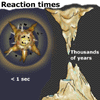The speed at which a chemical reaction occurs is referred to as its "rate of reaction". In this topic we will investigate what makes some reactions fast and others slow, how simple reactions occur, and how we can change the speed of a reaction (i.e. speed it up or slow it down).
Reaction
mechanisms
The process by which a chemical reaction occurs is known as its "reaction
mechanism". For a chemical reaction to occur, the reactant particles,
whether they are molecules, ions or atoms, must first collide with enough
energy to join together and form new substances. Then, if the orientation
of the particles towards each other is correct, a reaction can occur.
In the animation below hydronium ions (H3O+) and hydroxide ions (OH-) come together to form two water molecules (H2O). If the two ions can collide with the right orientation, and with enough energy, they will combine. If the orientation and energy are not correct, then a reaction will not occur.

|
Neutralisation |
With simple reactants, orientation of the particles is not a problem. With complex molecules, such as proteins, carbohydrates and other biological molecules, the orientation of the molecules to each other is the most important factor when considering the speed of reaction.
Conditions required for a successful
reaction
The three factors required for a successful reaction are:
- A collision must occur between the reacting particles.
- There must be sufficient energy for reaction to occur. This is known
as the activation energy for the reaction.
- Correct orientation of reacting particles is needed if more complex molecules are involved.
Factors
affecting the speed of a chemical reaction
 Chemical reactions can occur extremely quickly, happening in fractions
of a second (explosions for example), others are very slow. Amongst the
slowest is the formation of stalagmites and stalactites in caves, which
take thousands of years to grow. Many more, like digestion of food in
our stomachs and burning of a log in a fire, occur in time frames in between
these extremes.
Chemical reactions can occur extremely quickly, happening in fractions
of a second (explosions for example), others are very slow. Amongst the
slowest is the formation of stalagmites and stalactites in caves, which
take thousands of years to grow. Many more, like digestion of food in
our stomachs and burning of a log in a fire, occur in time frames in between
these extremes.
Five factors that affect the speed of a chemical reaction
- Reaction complexity.
- Activation energy of the reaction - energy required for the reaction
to occur.
- The state of the reactants (i.e. solid, liquid, solution or gas).
- The temperature at which the reaction occurs.
- The presence of a catalyst or enzyme.
| Copyright owned by the State of Victoria (Department of Education and Early Childhood Development). Used with Permission. |

